8. How did you handle: EDUCATION and FULFILLMENT?
Schooling
We used the American correspondence course: CALVERT SCHOOL.
Our only complaint is that it only goes to grade 8.
Excepting for grade one, we did not take the more expensive option of having the work monitored. It was difficult for us, due to being on the move and still rather ‘technically challenged', to have assignments ready and sent back to be marked and returned.
With hindsight, I would go about it differently as we do not have any certificates now to prove that Stefan has had any education other than grade one!
However it is a very comprehensive course and well worth using, and they also now have an online system, which makes it a lot easier. This has been available for some time, but we were not quite that organized at the time and only got into Internet late in the game!
Sometimes on long passages we had to do some school work too. It is not easy in the heat of the day but we found ways to make it comfortable on deck, and I quite enjoyed this part of cruising too.
At first I was by far too concerned about going about schooling in a very formal way.
It took me time to adjust, but in the end the school day became a lot less formal. With Oliver of course, Stefan having been (as is the fate of all first born babies) 'the guinea pig'. It worked out a lot less stressful as he was kind of eased into the first three years of schooling without really being aware that he was being 'schooled'. Indirect education works the best - so easy, so much fun and very effective.
Being a Montessori Pre-school teacher was a useful tool up my sleeve, and I enjoyed the space and time to 'experiment' and apply what I could of my experience. I enjoy this kind of thing and have endless photos of the various 'school oriented' things I kept myself amused with.
Stefan is due to do a skipper's course soon and is presently employed by his father. They do boat tours with a catamaran we have acquired since being back home.
Friendships and social interactions
We were fortunate to leave in the company of another family.
Martin, Lesley and Daniela of s/v Jadie, had been close friends for many years before we all finally made our cruising dream a reality. Initially Heiko and Martin had considered getting a boat together. Their daughter is a year younger than our Stefan, so it was fun cruising together with them for quite a few months. We eventually went off in different directions and only met up with them again later on in the adventure.
Another couple, Steven and Toya of s/v Cheers, whom we have also known forever, eventually also got out onto the cruising grounds, and we had many wonderful times reuniting with them. They are still cruising but currently visiting in Namibia, so once again we are enjoying their company, rehashing the good times we shared.
You miss your home-based families and friends; sadly you even loose some. That is just life, but it seems harder then, as you are so very far away in another world.
Yachties form 'seafaring families'.
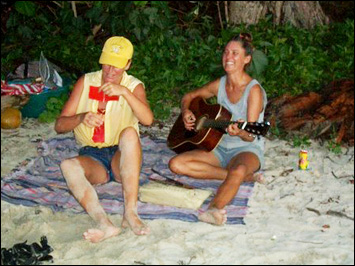 |
We spent many happy times with fellow yachties
at Contadora, Panama. |
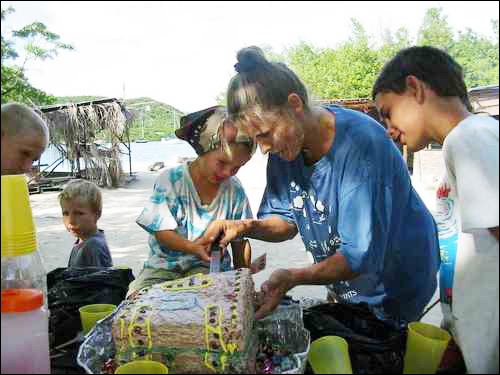 |
Birthday party at Hog Island, Grenada
(Photo: s/v ALLI NUI) |
But you meet very interesting and talented people like Donna Lange, Eileen Quinn, David of Epicurus and sailor/author/musician - Fatty Goodlander. You make friends and bump into them in various ports!
We met and befriended quite a lot of musicians along the way, some of them really talented, too. I finally started to come out of my shell and began enjoying the jams with these people on various
beaches, boats and other venues.
Yachties form 'seafaring families', providing support structures, friendship, love and caring for one another. Your children meet friends, and their parents become your friends too, so you just hang on in a certain anchorage for a bit longer to enjoy their company. Sometimes you meet again somewhere along the way; sometimes you never see them again. Listen to Eileen Quinn's "Time to Move On" lyrics - "a sailor has a restless heart. What draws us close - pulls us apart."
You meet such a variety of people, all striving to 'do their thing in the sun', and you realize you are not particularly special or unique out there. Certainly there are a lot of other folk doing just what you are, but each of us has his own way of experiencing things and a story to tell. It is sad moving on and mostly never again meeting the friends you met. Still you do also often reunite, and then a friend you made a few months or years back is a welcome sight, and a get-together or even a party is probably in the cards!
So many beautiful people out there. We enjoyed them all and miss them still.
The children met up with other children and always managed to have a good time.
Stefan was a shy child and at first found it difficult to make friends. However, he soon learned to get over his shyness and take the opportunity to make friends while they were in the same anchorage, before they or we moved on elsewhere! He was taken on by the older children when he first started socializing out there on the water and had invites to boats, to homes ashore (Grenada), and even to outings like the circus.
Oliver was a lot more confident and sociable from the start and just grew up into it; he never knew it any other way. He was luckier finding children of his own age, but Stefan made do and acted the "big brother" to the younger children.
This he learned from the children who showed consideration and took him on when he was younger and in need of a friend – and so children teach one another and themselves truly important lessons to last them a lifetime.
Both of them made friends and today, thanks to internet and Facebook etc. are still in touch with some of them.
|
We basically spent 7 years in the Caribbean, where Oliver was born, allowing him time to grow up and hoping that I would better cope once we moved on again.
- Tobago's Mount Irvine became our 'home away from home'.
We became very close with one local couple, Kay and Bertram, who took us on and into their home and became like extended family to us.
Their little blue shop became our second home in Tobago.
We often had barbecues or "COOKS" at that beach with Kay and Bertram very often providing the food (unless of course we had fish!) and us providing their guests with entertainment. It amazed them how the children would eventually just settle down and sleep on the Hobie cat or on a towel on the sand and snooze till we had to get back to our boat.
Then Stefan would be woken up to swim out and get our dinghy which was anchored just a bit off the shore break. He would do so each time, half asleep and usually without complaint, wrap a towel around himself afterwards, while Heiko and I gathered gear and baby and hopped on and then rode back to the boat. There we dusted the sand off baby and put him to bed. We had it all quite well worked out - family team effort and well worth it every time!
On only one of these occasions did we have a mishap with a wave washing over the entire boat as we took off. This drenched all of us, including our fast-asleep baby Oliver! He just grabbed a ‘boob' nestled closer and had a good drink all the way back to the boat – not phased at all by being soaking wet!
- We also loved Grenada's Hog Island, which is a paradise for yachtie children.
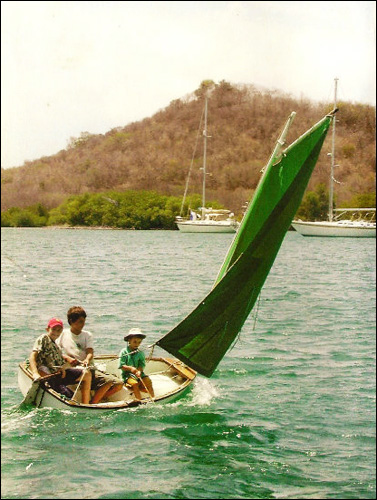 |
Nick Goodchild, Stefan and Oliver
sailing in Grenada - Hog Island
(Photo: Hutch of s/y AMBIA) |
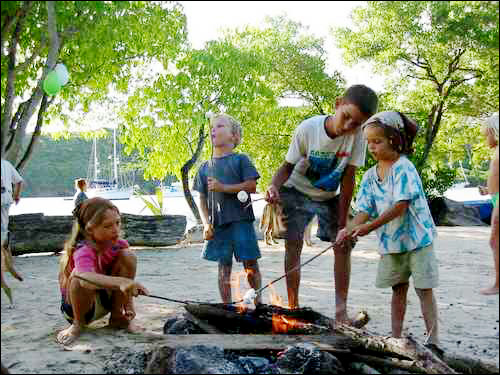 |
| (Photo: s/v ALLI NUI) |
This was our other Caribbean home bay. We were either at Hog Island or Mount Irvine for 7 years! (with a bit of other in between; we went north as far as St Martin for a bit, though we found it too expensive for our budget.)
A lot of families spent long periods of time there, because it was just so perfect for young children.
The beach is safe and easily accessible, and there are always a lot of children around, who soon team up and have the time of their lives acquiring social skills while playing games involving water, sand, forest trails, trees, bows, arrows, fishing, sailing, rowing, and experimenting with shelters, fires and food, etc.!
|
Keeping the kids entertained
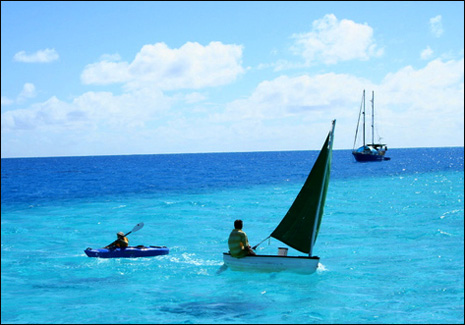 |
|
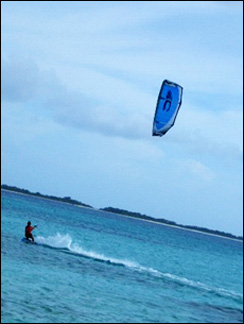 |
| Oliver and Stefan playing on the beautiful blue! |
|
Kiting - play time for Stefan and Heiko |
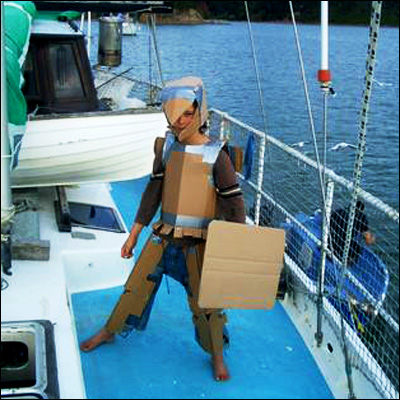 |
|
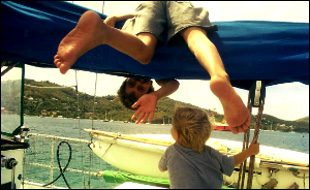 |
| Boat children games! |
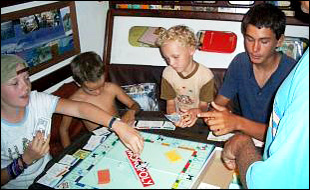 |
|
| Stefan created a suit of armour for Oliver out of a box which had contained our new toilet! |
|
Monopoly with the children
from s/v LILY MAID |
Boat children go up the mast, spiral down the stays like firemen, play on the ratlines, dive over the side, row/drive dinghies, make fires on the beach, use knives and machetes to cut and prepare, then cook their own food. Quite often they find the food they cook - fish, land crabs...
The yellow balloon
I remember one Xmas having somehow badly timed or planned things, having only a yellow balloon to give to Oliver for a gift. He was quite little then and played happily with it for days on end; quite blissfully oblivious to the load of gifts most kids get for these occasions.
Our policy was to get them the things they needed, like flippers, goggles, swim/sun wear, wetsuits, hats, etc. as they needed them and just bake a cake and enjoy a special meal on the day. |
We encouraged our children to read rather than rely on television for entertainment and set the example by doing so ourselves. We were not much into partying or socializing, although of course there were times we enjoyed those things, too. Mostly we lived within our financial limits, very simply, hanging out together as a family, rather than being tourists.
We had a DVD player on board eventually, but on a boat you can only enjoy that when there is enough power being generated. So either the engine should be running, or the wind howling, sometimes you might even have to be sailing! But we found ways and got a fair share of that.
The boys got quite constructive and inventive with their Lego games and still enjoy messing about on Lego projects these days. They had much inspiration from Hutch of s/y Ambia. He is a single handler and also gave Stefan quite a bit of help and encouragement sailing a dinghy in the earlier days.
In Ecuador and also New Zealand we encountered grandparent yachties who, in the first instance, offered to take Oliver to see a giant tortoise (He loved it and enjoyed the grandparenting experience.
I think this wonderful lady rather enjoyed
it too.). And, on a different occasion, another lady in New Zealand took a whole group of cruising kids first to the circus and then to a dinner! It is amazing how many sweet and generous folk there are out there on the water; some of them will never be forgotten.
Oliver is a bookworm personified - read read read...
I am not complaining, but his father and brother harass him endlessly to get a life away from books.
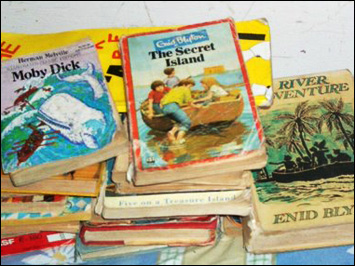 |
|
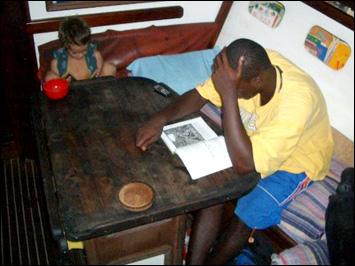 |
| Crossing Lake Gatum, Panama Canal - Oliver and our line handler Vladimar reading |
Going through the Panama canal we had two line handlers aboard for the night. They were "Dracula" and Vladimar - both of them very polite and friendly. We bedded them down - Dracula being older on Oliver's bunk and Vladimar in the saloon. They loved it. The younger guy - Vladimar - really got into our books.
Oliver was obsessed with reading then, as he had just figured out that he could, and it was actually a battle to get him outside to come and see everything, as he was so absorbed in his first real 'read'! |
Personal space aboard
Our personal space worked itself out:
- Heiko spent most of his time in the cockpit area - usually keeping an eye on things outside (weather conditions, traffic, fishing lines, and children), while at the same time reading a book or working on some project.
- Stefan and Oliver were out with the sailing dinghy - to the beach, fishing, snorkeling - or swimming over the side of the boat, playing on deck, lazing about in hammocks, or playing inside at the saloon table, in their cabin or on the bed in our cabin.
- I spent a great deal of time in our cabin - also on the bed which took up most of the space
- working on correspondence to family and friends on the computer, on the guitar, or sorting through school projects,
etc.
Family back home and their concerns
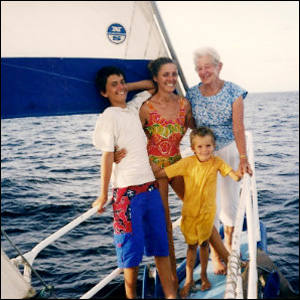 |
|
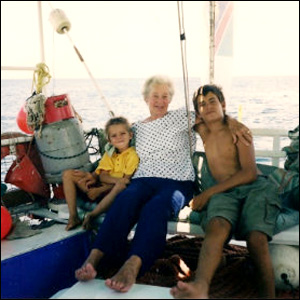 |
| Day sail from Mt Irvine to Charlottesville, Tobago with my mom Beryl Hockey |
The hardest part for me – and in fact the reason we came home – was the constant longing and concern for family back home.
We and they could not afford to visit often. In the 11 years out there, we flew home twice. Once I went alone with my sons, and the second time Heiko came with us. It was simply too expensive!
My mother is the only one who managed to find the finances and time to come out and spend 3 weeks on board with us. By her reckoning we had found a new home in Tobago, and she was determined to come and check it out for herself!
I regret the time my mother and my children did not spend together. They kept in touch via letters and later e-mail. Although it was hard for my mom, she coped well and never held it against us, but I am glad to be closer at hand again.
|